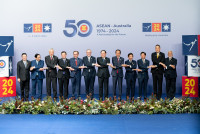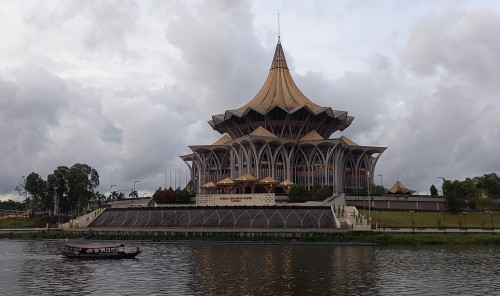THE executive board of the International Monetary Fund (IMF) concluded the Article IV consultation with Malaysia on a lapse-of-time basis.
Malaysia registered a strong post-pandemic recovery in 2022. Its strong macroeconomic policy frameworks, including a track record of fiscal prudence and a credible monetary policy framework, have served the country well.
Growth reached 8.7% in 2022 driven by pent-up domestic demand following the reopening of the economy in April 2022 and strong export performance.
However, recovery remains uneven with agriculture, mining, and particularly construction sectors remaining below pre-pandemic levels, and inequality has risen during Covid-19.
While costly and untargeted spending on subsidies – the highest in Malaysia’s history – helped suppress inflationary pressures, inflation remained broad-based and elevated at 3.4% for the year, despite recent signs of moderation.
Inflation expectations, however, remained well anchored.
Macro policies appropriately transitioned to the post-pandemic tightening cycle in 2022. The Bank Negara Malaysia (BNM) increased the overnight policy rate (OPR) four times since May 2022 by a total of 100 bps to 2.75% and paused the tightening thus far in 2023 to allow for an assessment of the impact of past rate hikes.
Budget 2023 is appropriately contractionary, targeting a decline in the overall deficit from 5.6% of gross domestic product (GDP) in 2022 to 5.0% in 2023, and down to 3.2% of GDP by 2025.
Lower growth and elevated inflation define the near-term outlook. Growth is projected to moderate to 4.5% in 2023 reflecting largely the global external headwinds.
Inflation is projected to remain elevated at 3.3% in 2023, with likely persistence in core inflation, amid a positive output gap, and evidence of a build-up of demand-side pressures.
Over the medium term, the current account surplus is projected to widen as the pandemic-related travel restrictions are lifted, leading to an improvement of the services balance, and as imports moderate.
Executive board assessment
In concluding the Article IV consultation with Malaysia, executive directors endorsed the staff’s appraisal as follows:
Malaysia registered a strong post-pandemic recovery in 2022. After a modest recovery in 2021, growth rebounded strongly in 2022 driven by pent-up domestic demand and resilient export performance, following the reopening of the economy in April 2022.
Malaysia’s 2022 external position is preliminarily assessed to be stronger than warranted by fundamentals and desired policies.
Downside risks, mostly external, cloud the near-term outlook. External risks include the possibility of an abrupt global slowdown or recession, with an associated spike in global risk premia, capital outflows and sudden stop risks.
Geo-economic fragmentation and geopolitical tensions resulting in a reconfiguration of trade, supply disruptions, and rising input costs among other disturbances, could negatively affect Malaysia’s growth prospects.
Staff urge authorities to stand ready to manage downside risks and policy trade-offs, if and when warranted.
The gradual fiscal consolidation strategy set out in Budget 2023 is appropriate, but it should be credibly underpinned by high-quality and durable measures. Staff advice on a path that involves a more significant consolidation over the medium term would put debt on a firm downward path.
Staff welcome the progress made in finalising the Fiscal Responsibility Act (FRA), a major reform expected to enhance governance and transparency and improve accountability and fiscal responsibility.
Developing a medium-term revenue strategy remains an urgent priority for Malaysia, especially in light of Malaysia’s significant spending needs under the 12th Malaysia Plan (12MP) and should be the cornerstone of the medium-term consolidation strategy.
Phased and transparently communicated subsidy reform is overdue, alongside social safety nets reforms, which would help enhance external rebalancing.
Monetary policy should tighten further to bring the stance to a neutral position and BNM should continue to clearly communicate the rationale for its policy decisions, given the rapidly evolving landscape and high uncertainty.
A tighter monetary policy will ensure inflation expectations remain well-anchored, while also creating space for monetary policy to respond to downside risks. The flexible exchange rate regime has served Malaysia well, and the authorities’ continued commitment to exchange rate flexibility is welcome.
The authorities’ commitment to safeguarding the stability of the financial sector is also welcome considering emerging risks.
Enhanced monitoring, especially of highly leveraged entities and non-bank financial institutions, is warranted given increased risks from rising interest rates, tighter financial conditions, exchange rate depreciation, and weaker expected growth. Expanding the macroprudential toolkit should support these efforts.
The Malaysian financial sector is well-equipped to navigate any potential increase in volatility and global risk aversion and there are no broad-based stability concerns.
The authorities’ intentions under the 12MP to credibly enhance economic resilience, move toward net zero greenhouse gas emissions, and promote inclusive growth, is welcome.
The start of the new government provides a timely opportunity to forge ahead with a concerted reform agenda.
Robust governance and anti-corruption reforms, including the implementation of the strategies outlined in the National Anti-Corruption Plan, would strengthen the management of the public finances, and improve public sector service delivery. – The Vibes, June 2, 2023












_and_lord_mayor_rajendran_posing_in_a_mock_up_lrt-Ian_pic.jpeg)








